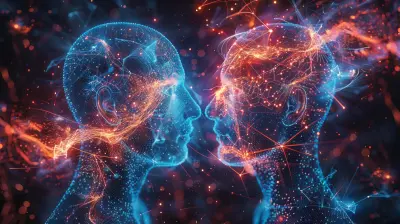Recognizing the Early Signs of Anxiety and Depression
5 October 2025
Anxiety and depression don’t just show up one day like an unwanted guest at your doorstep. They sneak in gradually, like a slow Wi-Fi connection that you don’t notice until you’re stuck staring at a loading screen for way too long.
The problem? Many people don’t recognize the early signs. They brush them off as “just stress” or “a bad mood.” But spotting these red flags early on can make a huge difference. So, let’s break it down—what are the warning signs, and when should you pay closer attention? 
Why Ignoring Mental Health is Like Ignoring a Check Engine Light
Imagine you're driving your car, and suddenly, that little check engine light pops up. Do you ignore it and keep driving until your car won’t start? Or do you take it in for a quick check-up?Your mental health works the same way. Those tiny warning signs? They matter. Ignoring them might not seem like a big deal at first, but over time, they can snowball into full-blown anxiety or depression.
Time to pop the hood and check for early symptoms! 
Early Signs of Anxiety: When Worry Turns into Overdrive
Anxiety isn’t just feeling nervous before a big presentation or stressing about an exam. It’s more than that—it’s a persistent feeling of unease that doesn’t seem to go away. Here’s how to tell if anxiety is creeping in:1. Racing Thoughts That Won’t Hit the Brakes
Ever feel like your brain is running a marathon with no finish line? Overthinking everything—what someone said, what might go wrong, or even things that haven’t happened yet—is a big red flag.2. Restlessness That Makes You Feel Like a Shaken Soda Bottle
Can’t sit still? Feel like there’s a constant buzzing inside you? That’s restlessness, and it’s a classic early sign of anxiety.3. Physical Symptoms That Don't Make Sense
Anxiety doesn’t just mess with your thoughts—it targets your body, too. Look out for:- Headaches
- Stomachaches
- Muscle tension
- Rapid heartbeat
It’s like your body is on alert mode for no apparent reason.
4. Sleep Troubles That Turn You into a Zombie
Anxious thoughts love to visit at bedtime. Either you can’t fall asleep because your brain won’t shut up, or you wake up multiple times feeling on edge.5. Avoiding Situations Like a Pro-Level Escape Artist
Anxiety often makes people avoid things they once enjoyed. Social events feel overwhelming, tasks seem too hard, and even answering messages feels like climbing Mount Everest.
Early Signs of Depression: When Life Feels Like It’s on Mute
Depression isn't just "feeling sad." It’s more like your emotions have been put on airplane mode—everything feels dull, heavy, and pointless. Here’s what to watch for:1. Constant Fatigue That No Amount of Coffee Can Fix
If you’re feeling drained all the time, even after a full night’s sleep, depression might be the culprit. It’s like your energy tank is permanently running on empty.2. Losing Interest in Things You Once Loved
Remember when you loved binge-watching your favorite series or going out with friends? When those things suddenly feel like a chore rather than fun, it’s a major warning sign.3. Changes in Appetite That Don’t Make Sense
Depression messes with your appetite in weird ways. Some people lose their appetite completely, while others eat like they’re trying to fill an emotional void with snacks.4. Feeling Like a Failure (Even When You’re Not)
Negative self-talk becomes a daily habit. You convince yourself you’re not good enough, that you’re failing at everything—even when there’s no real reason to believe it.5. Sleep Patterns That Are a Complete Mess
Too much sleep or barely any sleep at all—depression loves to mess with your bedtime routine. Either way, you wake up feeling just as exhausted.6. Emotional Numbness That Makes Life Feel Gray
One of the most overlooked signs of depression is emotional numbness. You don’t feel happy, but you don’t feel sad either. You just… exist.
When Anxiety and Depression Tag-Team
Here’s the tricky part—anxiety and depression often show up together, like an annoying dynamic duo. One makes you feel overwhelmed; the other makes you feel like you don’t care. It’s like being stuck between an overactive brain and a loss of motivation.If you’re experiencing symptoms from both lists, it’s even more important to reach out for support.
What Should You Do If You Spot These Signs?
Recognizing the early signs of anxiety and depression is the first step, but what comes next?1. Talk to Someone You Trust
You don’t have to go through this alone. Open up to a friend, family member, or therapist. Talking things out can help lighten the load.2. Prioritize Self-Care (No, It’s Not Selfish)
Taking care of yourself isn’t a luxury—it’s a necessity. Try:- Getting enough sleep
- Eating balanced meals
- Moving your body (even a short walk helps)
- Practicing mindfulness or meditation
3. Write It Down
Journaling might sound cheesy, but trust me—it works. Getting your thoughts out on paper can help you process what’s going on inside your head.4. Challenge Your Thoughts
Anxiety and depression love to feed you lies. The next time your brain tells you you’re not good enough, ask yourself: "Would I say this to a friend?" If not, it’s time to challenge that inner critic.5. Seek Professional Help When Needed
There’s no shame in asking for help. Therapists and counselors are trained to help you navigate these feelings. Even a quick consultation can provide clarity.Final Thoughts: Mental Health Deserves Attention
If you take one thing away from this article, let it be this—your mental health matters. Anxiety and depression don’t define you, but recognizing their early signs can help you take back control before they take over.So, if you’ve been feeling off lately, don't ignore it. A little self-awareness today can prevent a deeper struggle tomorrow. You’ve got this.
all images in this post were generated using AI tools
Category:
Mental Health EducationAuthor:

Jenna Richardson
Discussion
rate this article
1 comments
Dana Lopez
This article effectively highlights the subtle early signs of anxiety and depression, emphasizing the importance of awareness and intervention. Recognizing these symptoms can significantly improve outcomes and foster timely support.
October 11, 2025 at 4:47 AM

Jenna Richardson
Thank you for your insightful feedback! I'm glad you found the article helpful in raising awareness about early signs of anxiety and depression.


